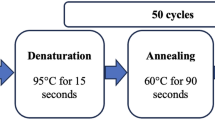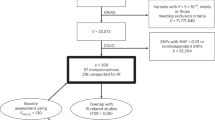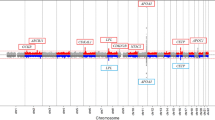Abstract
A common polymorphism, rs7566605, 10 kb upstream of the insulin-induced gene 2 transcription start site has been associated with obesity in Caucasian and African-American populations, with the hypothesis that an alteration in gene expression results in elevated plasma triglyceride levels. The goal of this study was to verify the findings in a cohort of 2721 healthy Caucasian men (second Northwick Park Heart Study), and a separate study of 747 type 2 diabetic patients from Caucasian, Afro-Caribbean and Indian groups (University College London Diabetes and Cardiovascular Disease Study).The rs7566605 single-nucleotide polymorphism (SNP) was not related to plasma triglyceride levels in either study, and we found no association with body mass index or obesity in either cohort, despite having the power to detect the previously reported effect. This suggests that, at the least, the true size of the effect on obesity of this SNP is likely to be considerably less than reported previously.
This is a preview of subscription content, access via your institution
Access options
Subscribe to this journal
Receive 12 print issues and online access
$259.00 per year
only $21.58 per issue
Buy this article
- Purchase on Springer Link
- Instant access to full article PDF
Prices may be subject to local taxes which are calculated during checkout
Similar content being viewed by others
References
Herbert A, Gerry NP, McQueen MB, Heid IM, Pfeufer A, Illig T et al. A common genetic variant is associated with adult and childhood obesity. Science 2006; 312: 279–283.
Miller GJ, Bauer KA, Barzegar S, Foley AJ, Mitchell JP, Cooper JA et al. The effects of quality and timing of venepuncture on markers of blood coagulation in healthy middle-aged men. Thromb Haemost 1995; 73: 82–86.
Alberti KG, Zimmet PZ . Definition, diagnosis and classification of diabetes mellitus and its complications. Part 1 diagnosis and classification of diabetes mellitus provisional report of a WHO consultation. Diabet Med 1998; 15: 539–553.
Stephens JW, Hurel SJ, Acharya J, Humphries SE . An interaction between the interleukin-6 −174G>C gene variant and urinary protein excretion influences plasma oxidative stress in subjects with type 2 diabetes. Cardiovasc Diabetol 2004; 3: 2.
Stephens JW, Hurel SJ, Cooper JA, Acharya J, Miller GJ, Humphries SE . A common functional variant in the interleukin-6 gene is associated with increased body mass index in subjects with type 2 diabetes mellitus. Mol Genet Metab 2004; 82: 180–186.
Gable DR, Stephens JW, Cooper JA, Miller GJ, Humphries SE . Variation in the UCP2-UCP3 gene cluster predicts the development of type 2 diabetes in healthy middle-aged men. Diabetes 2006; 55: 1504–1511.
Hamon SC, Kardia SL, Boerwinkle E, Liu K, Klos KL, Clark AG et al. Evidence for consistent intragenic and intergenic interactions between SNP effects in the APOA1/C3/A4/A5 gene cluster. Hum Hered 2006; 61: 87–96.
Corella D, Ordovas JM . Single nucleotide polymorphisms that influence lipid metabolism: interaction with dietary factors. Ann Rev Nutr 2005; 25: 341–390.
Helgadottir A, Manolescu A, Helgason A, Thorleifsson G, Thorsteinsdottir U, Gudbjartsson DF et al. A variant of the gene oncoding leukotriene A4 hydrolase confers ethnicity-specific risk of myocardial infarction. Nat Genet 2006; 38: 68–74.
Acknowledgements
We thank the staff of the participating NPHS general practices (for list see6), and Professor George Miller and Dr Steve Hurel for access to the NPHSII and UDACS data. This work was supported by the British Heart Foundation (RG2005/014).
Author information
Authors and Affiliations
Corresponding author
Rights and permissions
About this article
Cite this article
Smith, A., Cooper, J., Li, L. et al. INSIG2 gene polymorphism is not associated with obesity in Caucasian, Afro-Caribbean and Indian subjects. Int J Obes 31, 1753–1755 (2007). https://doi.org/10.1038/sj.ijo.0803645
Received:
Revised:
Accepted:
Published:
Issue Date:
DOI: https://doi.org/10.1038/sj.ijo.0803645
Keywords
This article is cited by
-
Controversial association results for INSIG2 on body mass index may be explained by interactions with age and with MC4R
European Journal of Human Genetics (2014)
-
INSIG2 variants, dietary patterns and metabolic risk in Samoa
European Journal of Clinical Nutrition (2013)
-
Association of an INSIG2 obesity allele with cardiovascular phenotypes is gender and age dependent
BMC Cardiovascular Disorders (2010)
-
The INSIG2 rs7566605 polymorphism is not associated with body mass index and breast cancer risk
BMC Cancer (2010)
-
Studies of CTNNBL1 and FDFT1variants and measures of obesity: analyses of quantitative traits and case-control studies in 18,014 Danes
BMC Medical Genetics (2009)



